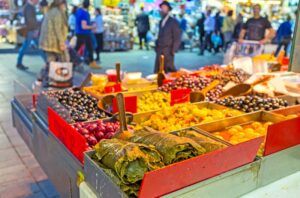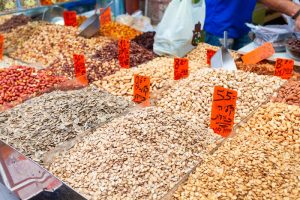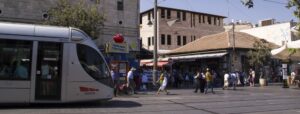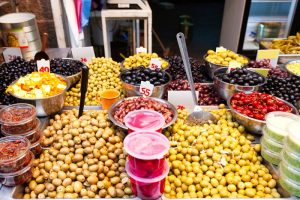Machane Yehuda Market is also well-known as the shuk all over Israel, being Israel’s most impressive and extravagant market. The shuk is situated in Jerusalem, which is the capital of Israel, and its style adds to the city’s unusual character. In Machane Yehuda, there is everything you could need, clothes, housewares, flowers, art, accessories, all kind of fresh local food such as fresh-baked bread, desserts, baked products, meat, fish, eggs, spices, dairies, and much more. The shuk is also an excellent location for Jerusalem’s nightlife, with all sorts of eateries, cafés, bars and music clubs.

Machane Yehuda Market In The Ottoman Period
The history of Machane Yehuda Market dates back to the Ottoman period. Since the 19th century, the shuk was a vacant plot built by local farmers bringing local products to sell in this central area. Slowly the public terrains were converted into an established and thriving market. Its success was mainly due to its location, which was very close to neighbourhoods and villages outside of Jerusalem’s Old City. Nonetheless, the Ottoman governours did not want to develop any infrastructure for the market, lacking drainage ditches and stalls for the sellers. Hence, both the farmers and Arabs who set up the shuk began building their shops and depositories.
Machane Yehuda Market In The British Mandate
During the British Mandate, from 1917th to 1948th, the shuk underwent modifications that changed the outward appearance of this market. The first governor of Jerusalem, Ronald Stores, noticed the vitality of the shuk, which was changing Jerusalem’s unique atmosphere. Ronald Stores, who was the first governor of Jerusalem, nominated Charles Robert Ashby as city engineer and an architect to redesign the exterior design of the shuk. Ashby planned necessary infrastructures, such as fitting sewerage, dumping systems, illumination, and streaming water. Moreover, the plan of Ashby foresaw an enlargement of the market, building walls on each side with the employment of Oriental-style gates with arched domes matching the Mandate Period architecture style.

The Etz Chaim Yeshiva Shops
Ashby’s design was not fulfilled because of funds restrictions; hence, the market maintained its faded condition. However, in the course of the years, a more significant number of customers started to frequent the shuk. The traders began to increase, and a part of the Arab merchants sold places to the new Jewish immigrants. In that period, the Etz Chaim Yeshiva, which was located amid the market, installed a series of shops beside the wall of the shuk, received the rent from the merchants, and, in this way, succeeded to raise the income of the yeshiva.
The Market After the Declaration of Independence
During the years, the Machane Yehuda market continued its expansion, and nowadays, it extends over a large surface in Jerusalem’s city centre, expanding from the Etz Chaim Yeshiva to the Bet Yaakov and from Jaffa Street to Agrippas Street. Today it is a very prosperous place that remained authentic and blending the old-fashioned with the trendy. The market is presently managed by Machane Yehuda Management, with representation from designated retailers. The management team is in charge of the market’s business progress, and it is in regular connection with Jerusalem’s city hall, the Ministry of Health and other government entities.

Restaurants In Machane Yehuda
Many restaurants in Machane Yehuda are unique and worth a visit for their culinary specialities. The main restaurants are enlisted here below, and they are inside the shuk.
Hachapuria
The Hachapuria restaurant is a well-known establishment in the Machane Yehuda market, producing exquisite Georgian pastries to its passionate clients. The tasty pastries are baked on the spot, and they are made following secret family recipes. Clients of Hachapuria are not only enthusiasts of the food, but they love to immerse themselves in some of the Georgian “chutzpa” as well; hence, it is better to order in advance also to have extra time for visiting the store.
Pasta Basta
At the Pasta Basta restaurant, only high-quality raw materials are used, which come straight from the market, and some are imported from Italy. The pasta is made every morning, and sauces and desserts are also made on the spot.
Aldo – Fresh Market Gelato
At Aldo Mahane Yehuda, there is one of the best icecreams in the city of Jerusalem. They employ the finest raw materials from Italy, mixing them with nuts, spices and fruits coming only from the Mahane Yehuda Market. You will experience very delicious tastes, tasting outstanding and authentic Italian gelato flavours every day.
HaAgas 1
HaAgas 1 is named after a song by famous Israeli singer-songwriter Ehud Banai, and it is a vegetarian restaurant in the shuk. The Banai family lived over their vegetable store, and you will find many choices in a very healthy menu.
UZI ELI’s
A famous person in Machne Yehuda is Uzi Eli, who has a colourful stand where he prepares freshly natural squeezed juices with no additives, such as quince juice, sugarcane juice, using several herbs and spices. He is a salesman and also a healer with an unforgettable personality.
Touring Through Machane Yehuda
A classic Machane Yehuda tour is very recommended, and it allows participants to be immersed in the lively atmosphere. The tour is organised through the colourful streets of the market, explaining its history and the neighbourhood’s story. You can learn about famous Jerusalem families that have lived in the area during the years and about the development of the Machane Yehuda Market and all its modern transformations. During the tour, you will have the opportunity to savour some of the food from the most exciting stands in the market. You can also speak with the vendors and listen to some of their exciting and entertaining stories that became part of the unique history of the Machane Yehuda population. The tour also includes an excursion through the nearby Nachlaot neighbourhood to learn its history. The tour includes a break under the famous and still fruitful “berry tree” mentioned in Yossi Banai’s song. The tour stops at some types of stands for explanations and tastings such as spices, Israeli olive oil, Jerusalem-style tahini and halva, healthy drinks and natural healing products, bakeries, chocolates, and sweets shops. There is never something boring at the shuk! Every day it is a new experience with new flavours, colours, tastes, scents of this magic Middle Eastern place.


